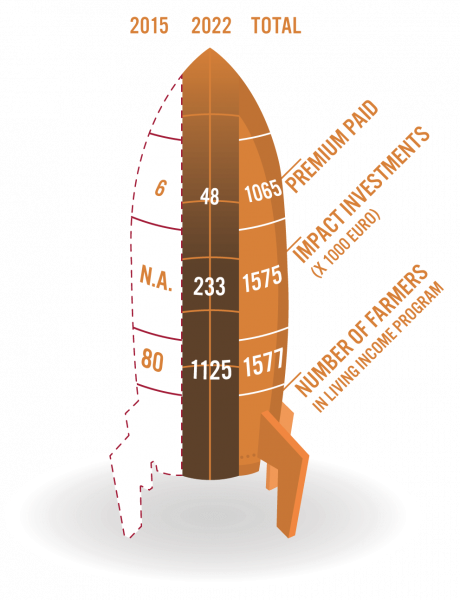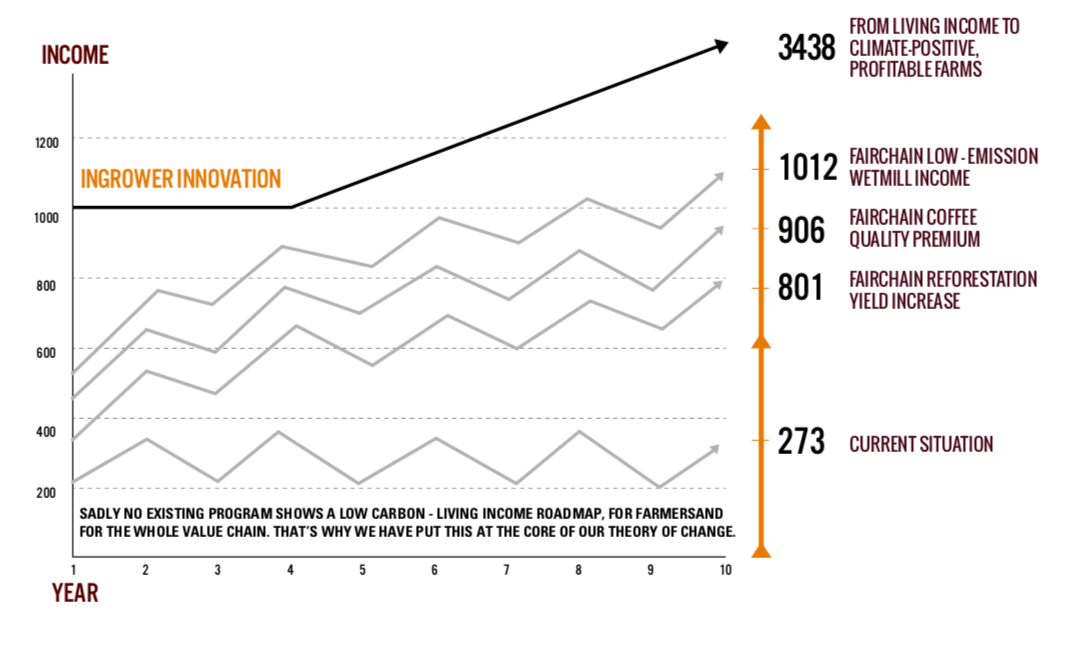LET'S FIX THE FUTURE!
We’re staring down a future filled with chaos—widening social divides, skyrocketing inequality, growing poverty, deforestation, and climate change. One thing’s crystal clear: now more than ever, we need better business models. Models that solve problems instead of making them worse.
That’s exactly what FairChain and Moyee are about—building a company around Economic, Social, and Environmental impact. Want to dive into our environmental work? Check out our latest update on the CO₂ performance ladder. We hope it inspires you to make a difference too. Thanks for supporting us all these years. Let’s fix the future!
Let’s talk numbers!
Moyee Coffee started as a social enterprise—a business with a mission to create impact, not shareholder profit. Back in the early days, we paid smallholder farmers a 20% premium on their coffee beans—double the rate of most fair trade or ethical initiatives. At the time, we thought we were leading a revolution. We were bold. We were proud. But… we didn’t know nearly enough.
Working with 100 small-scale farmers in rural Ethiopia to improve bean quality taught us a hard truth: that 20% premium wasn’t even close to enough for farmers to earn a decent income. While it bumped annual earnings from €400 to €500, our on-the-ground work and income research showed that farmers needed to double or even triple that just to meet basic needs—food, health, education, shelter, and a little savings to escape the poverty cycle.
So, we hit the reset button.
Working closely with the FairChain Foundation, we launched a bold new program to bring farmers a living income—by helping them run profitable farms and participate in value-added activities. We pivoted from just paying a premium to creating something we now call the Living Income Differential.
Real impact takes time. But season by season, we’re helping more farmers grow the planet-friendly, people-positive beans that power FairChain. And we’re not just measuring sales—we’re tracking impact. Here's how:
IMPACT BY THE NUMBERS
€1,065,000
FairChain Premium Paid
We paid €1,065,000 in premiums for beans from Ethiopia and Kenya. That’s an average of 300% above the Fairtrade minimum price in Ethiopia, and 20% above co-op prices in Kenya.
€1,575,000
Living Income Differential Investments
In 2022, we invested €233,000 in our Living Income program—bringing our total investment to €1.575 million since the start.
1,577
Farmers in Our Living Income Program
1,577 farmers in Ethiopia and Kenya are now part of the FairChain family. Plus, 2,500 more in Kenya are starting to grow low-chemical FairChain coffee thanks to sustainable compost innovations.
Want me to continue with the rest? There's a lot of impact goodness left to unpack!
IMPACT EXPLAINED
What is the Living Income Differential?
A living income means enough income for a household to afford a decent standard of living. That includes a nutritious diet, clean water, safe housing, education, healthcare, transport, clothing, and a bit of a buffer for the unexpected.
Our Living Income Differential isn’t just a price—it’s a series of targeted investments that bring us closer to our Living Income Roadmap. But ultimately, we want to phase out these investments and instead pay farmers a Living Income Reference Price—the minimum price needed for an average farmer with a viable farm size and good productivity to earn a living income just from their harvest.
We’re proud to be the only coffee company putting living income at the heart of what we do—and tracking progress every step of the way.
IT'S NOT JUST ABOUT PAYING MORE
Yes, paying higher prices is essential. But that alone won’t cut it. We also need:
- Bigger harvests
- Lower production costs
- Reduced cost of living
The reality? Upfront investments are steep. But as our work begins to bear fruit—literally—we’ll see gains in bean quality, yields, and income.
The average income of a 7-person coffee farming family in Ethiopia? Just €521 per year. Our Living Income Benchmark? €1,055—based on coffee and side incomes from our partner farmers in Limmu, Ethiopia.
Since kicking off our living income research, it's been our north star. We’ve had challenges—like a bad harvest in 2018—but we kept learning and adapting. We created a data pool of 100 farmers in Limu to better understand reality on the ground. At the start, they earned just €267 per year from coffee. After our interventions? That jumped to €598—almost hitting our benchmark. In 2019, earnings dipped again, but bounced back in 2020.
While we keep close tabs on the Limu 1 farmers, we’ve launched a new living income pilot with 200 more farmers (Limu 2). In 2021, we scaled the program to 12,000 farmers in Southern Ethiopia and 2,600 in Kenya. And we’re not stopping—more pilots, new roaster partnerships, and expanding the model are all on the way.
THE FAIRCHAIN FORMULA
The FairChain model is built to achieve living income through:
- Better quality & higher yields
- Lower costs through tech and tools
- Access to credit, healthcare, and resources
We also believe coffee has the power to flip development models in resource-rich regions. Want proof? Read on.
SUCCESS STORIES
1. From 100 to 650+ Smallholder Farmers
When it comes to impact, scale matters. Every extra kilo of coffee you drink helps us support more farmers through our FairChain Farming program.
These farmers are among the smallest and poorest in their regions, many trapped in generational poverty. Our Living Income Roadmap is often their first real chance to break out.
And we’re just getting started—this program can scale up to 12,500 farmers, enough to transform entire communities.
2. The Start of the 1 Million Tree Revolution
Most of our farmers own less than 1 hectare of land and yield just 180 kg of green beans per hectare. We’re changing that.
Tree planting is key to our Roadmap. Last year alone, we delivered 35,000 seedlings to farmers and invested in two nurseries to scale up to 400,000 seedlings per year. Better trees = better coffee = better income.
3. FairChain Blockchain: Transparent Payments
In 2017, we became the first coffee company to put farmer payments on the blockchain—and we still do it today.
Why? It’s more than transparency. It helps us understand what farmers earn, unlock credit lines, and make it possible to bank the unbanked—farmers previously written off as “non-bankable.”
4. Bank Accounts, Digital Wallets & Women’s Empowerment
In 2019, our FairChain crew in Limu opened 371 bank accounts for farmers—93 of them for women. The local bank was floored.
Now, over 570 farmers have digital wallets that give them secure, paperless, real-time access to their money.
Even better? These wallets give women financial autonomy. And if you're a Moyee drinker, you can contribute directly to a farmer’s digital wallet. No middleman. Just impact.
5. The First FairChain Wet Mill
We recently opened our first FairChain wet mill—a game-changer for farmers.
Traditionally, wet mills are owned by wealthy farmers or co-ops that pocket most of the profits. Ours is different: profits are shared with the local community.
Plus, the mill created 118 seasonal jobs, most of them for women.
OUR SOCIAL TO-DO LIST
We’re always learning. This is uncharted territory for many, including us—but we know where we’re going. 
By 2025, we aim to:
- Help 5,000 farmers get on the path to a living income
- Prove our first wave of farmers has moved above the poverty line
What’s next?
- Open two more wet mills in Ethiopia
- Scale up FairChain Farming with 1,000 more farmers
- Expand activities in Kenya—and soon, Colombia
- Launch a new Living Income Study and set a Living Income Reference Price for Ethiopian coffee
- Create new value-added activities, like husk processing—turning coffee cherry skins into compost, fermented products, pectin, and more
- Roll out the first blockchain-powered microloan for farmers
- Launch Version 2 of our Farmer Dashboard to connect coffee lovers and growers directly. Total traceability = #storyproving
FairChain isn’t just a coffee model—it’s a roadmap to dignity, sustainability, and shared prosperity.
Let’s keep building it. Together. 💚

